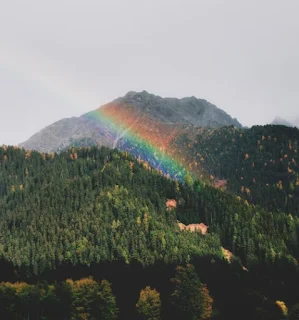African Rainbows, Folklore Meets Physics, Rainbows hold spiritual significance that transcends cultures and religions.
In numerous regions of Africa, rainbows are believed to convey messages to loved ones who have passed away or to signal good luck and blessings to come.
In the Bible, a rainbow is a sign of God's promise never to flood the earth again. In Hinduism, rainbows form a bridge between the physical and spiritual realms. Some Native American cultures see them as symbols of unity under the Great Spirit.
Rainbows and African Spirituality
Across Africa, rainbows carry layered meanings:
- South Africa: Good luck, prosperity, and a bridge between worlds.
- Ghana: Linked to Anansi, the spider trickster who climbs rainbows to visit the gods.
- Ancient Egypt: Connected to goddess Isis, symbolizing rebirth and the afterlife.
- Nigeria: Rainbows are seen as pathways to the spirit world, sometimes tied to Olokun, the ocean deity.
Rainbows are generally viewed positively, symbolizing hope, connection, and divine presence.
Where to See Spectacular Rainbows in Africa
- Victoria Falls (Zimbabwe/Zambia): Mist creates vivid rainbows, especially early morning & late afternoon.
- Cape Town (South Africa): Mountains and ocean moisture make stunning winter rainbows.
- Sossusvlei (Namibia): Rainy season rainbows over dunes from Jan–Apr.
- Lake Malawi: Calm waters and rainy-season sunlight create perfect arcs.
- Mount Kilimanjaro (Tanzania): High altitude & mist make dramatic rainbow scenes.
Myth vs. Science — Why Rainbows Inspire Awe
Spiritual view: Across Africa, rainbows are seen as bridges to ancestors, messengers of hope, or signs of prosperity. Folklore tells of water spirits like Mami Wata and tricksters such as Anansi climbing rainbows to speak with the gods.
Scientific view: A rainbow appears when sunlight bends and reflects inside raindrops, splitting into colors. Double rainbows form when light bounces twice, flipping the color order.
Takeaway: Whether you see a rainbow as physics or a message from beyond, its beauty unites culture and science in wonder.
The Science Behind the Arc
Rainbows appear when sunlight refracts (bends) and reflects inside raindrops. Colors separate by wavelength, forming the classic arc (red on top, violet below). Sometimes a second, fainter double rainbow appears with reversed colors.
How to Improve Your Chances of Seeing a Rainbow
- Find rain + sunshine right after a shower.
- Stand with your back to the sun, face the rain or mist.
- Visit waterfalls or fountains where spray creates mini-rainbows.
- Be patient and observant — rainbows appear quickly and fade fast.
Did you know many Africans believe rainbows are messages from ancestors, reminding loved ones they are still watching and protecting?
Explore More African Spiritual Insights
- Mami Wata: Africa’s Water Spirit Mythology
- How Africans Honor Ancestors as Protectors
- African Proverbs About Rain and Blessings
🌍 Folklore Meets Science — African Stories that Explain the Universe
Where African mythology and natural science meet — revealing how ancient wisdom explained the forces of nature long before modern discovery.
🔭 Explore the Folklore Meets Science SeriesContinue exploring Folklore Meets Science — stories where African mythology and modern discovery walk hand in hand.













